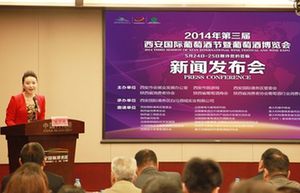Latest technology gets people talking
By Jiang Xueqing ( China Daily ) Updated: 2013-04-15 07:54:20Operators criticized
In a statement issued on April 6, the federation criticized telecom operators for charging high fees for data transmission through a virtual monopoly. China Mobile, for example, charges 0.1 yuan for a text message of up to 70 Chinese characters, 0.3 yuan for a domestic multimedia message and 1.5 yuan for an international multimedia message of up to 300 kilobytes.
"For many years, these 'monopolies' have made extremely high profits. By using their dominant position, they have attempted to obstruct and force out new technologies and applications through administrative means, instead of producing technological innovations and improving their own competitiveness," said the statement.

The federation also slammed the telecom operators for charging twice for the same service, given that mobile users have already paid for the use of the telecom facilities.
"Charging Tencent for its signaling traffic would be like charging for the names, addresses and post codes on envelopes. That's ridiculous," said Du.
China Mobile did not mention in its e-mail whether it, or the other major telecom operators, will charge Tencent for hosting WeChat. Instead, the company blamed OTT services for occupying the signaling channel continually, causing congestion in the network, something that not only affects the quality of basic telecommunication services, but also endangers network safety; OTT applications have increased the volume of signaling traffic and led to telecom operators overseas suffering network outages.
In the telecom industry, signaling refers to the practice of sending a signal from the transmitting end of a telecom circuit to inform a user at the receiving end that a message is to be sent. Like a switch, it controls the beginning and end of the information exchange.
"In the past, the establishment of telecommunication behavior (such as constantly polling the network to establish new connections) was not so frequent, so we assigned a relatively narrow channel to signaling," said a China Mobile employee who preferred not to be named. "But messages are constantly sent to the servers to let them know that users are still online. As a result, our signaling channel is congested. It has affected regular mobile telecommunications services, such as voice services."
"On the one hand, we will put more resources and investment into expanding our network capacity. On the other hand, we are calling for the establishment of a mechanism to administer third-party applications and prevent them from occupying public resources unscientifically and uneconomically," he said.
Technological innovation
However, according to the China Computer Federation, the telecom operators have not provided sufficient independently certified data to prove that WeChat's signaling has caused the telecom network to crash.
Even if the problem really is serious, several providers of telecom equipment and network solutions, such as ZTE Corp, have claimed they can solve the problem through technological renovation, said Du of the federation.
"When talking about the signaling problem, China Mobile avoided mentioning a crucial element - that is, the company's 2G (second generation) network is not designed for large-scale data services," said Kan of the University of Posts and Telecommunications.
China Unicom and China Telecom have no such problem because they have built 3G networks, he added.
On March 25, China Telecom denied it was in negotiations with Tencent regarding charges for WeChat. According to a company representative, OTT services have affected voice services and traditional value-added services to a certain degree, but they have also helped China Telecom to exploit its advantages in 3G networks and promoted rapid growth in mobile-data services.
In an e-mailed reply to questions from China Daily, Tencent said it has conducted technological optimization of the 2G/2.5G networks and hopes to reduce the pressure of WeChat's signaling to gateways through technical communication, cooperation and innovations with telecom operators.
"In China, telecommunications services are divided into basic telecom services and value-added services. Only the three main telecom operators are allowed to provide basic telecom services. But WeChat redefines what is a value-added service and what is a basic telecommunications service. That's what makes the operators afraid," said a partner at a Beijing law firm, who asked not to be named. "WeChat will also change the current structure of interest (the market share) among the major telecom operators," he said.
China Mobile has reacted strongly to WeChat because the service has placed a heavy burden on its signaling channel across the 2G network. The money earned from WeChat's data traffic can't cover the company's investment in the basic network, including signaling channels, he added.
This year, China Mobile will invest more than 41 billion yuan in its mobile communications networks, including its TD-LTE 4G network. The lawyer said the company stands to lose a great opportunity for development if it continues to fight the fast-growing WeChat. Once construction of its 4G network is complete, in three to five years, the growth of the network will rely heavily on data traffic brought by apps such as WeChat.
"Sooner or later, WeChat will build innovative business models such as mobile payment, mobile banking and mobile advertising to bring in huge revenues. Telecom operators should sit down with the service providers to discuss whether or not to charge fees for using the service, how much those fees will be and how they will be paid," he said.
|
|
|
|
|
|
|
|


















 Op Rana
Op Rana Berlin Fang
Berlin Fang Zhu Yuan
Zhu Yuan Huang Xiangyang
Huang Xiangyang Chen Weihua
Chen Weihua Liu Shinan
Liu Shinan